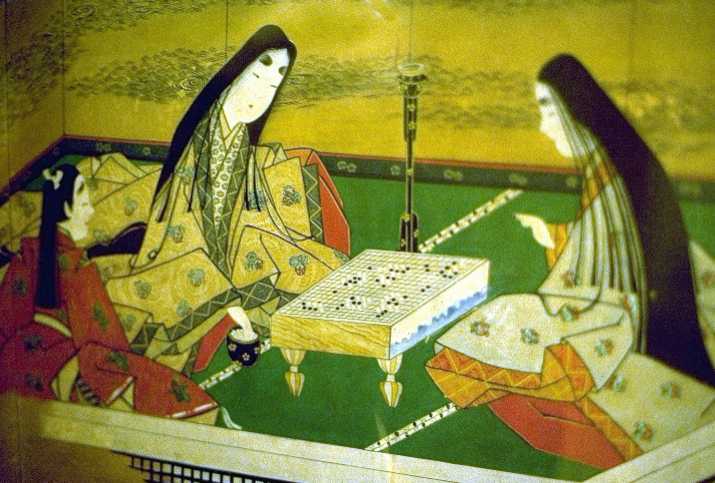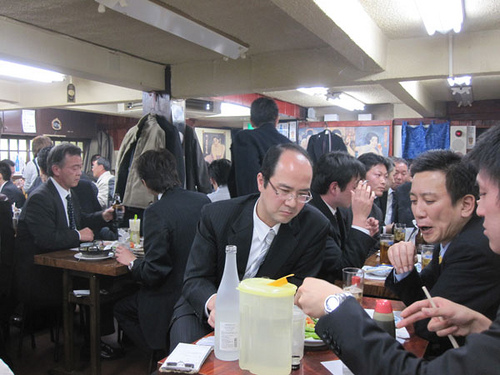Foreigners are often upset when their Japanese counterparts break verbal commitments or fail to live up to the signed agreements. Where the foreigners themselves “fail” is that they are ignorant of the etiquette and ethics of the Japanese and do not realize that what they think is wrong, may be regarded as right in Japan.
The reality behind a pleasing facade
In formal official dialoge in Japan, especially with government bureaucrats and politicians, what you hear is generally not what you get. Rather than speaking frankly and fully, the Japanese way is to speak in vague and esoteric terms, particularly when they cannot or do not intend to cooperate or follow through in any way. Generally in order to communicate effectively in Japan, one must be able to interpret relationships, the circumstances, and the behaviour of individuals and groups rather than words- something that requires a comprehensive knowledge of the history and culture of the country. The reason for this extraordinary situation is that a long time ago Japanese culture and society developed in such a way that appearances took precedence over reality and were used to obscure reality behind a pleasing facade.
This development apparently came about because of the etiquette system that derived from the imperative of maintaining minutely prescribed harmonious relationships between individuals based on their social class, rank, gender and other factors. As this etiquette became ritualised, it took on a life on its own, became a vital part of the moral standards of the Japanese, and was often given more importance than the substance of dialoge between individuals.
Again in formal situation in particular, what was only alluded to or was left completely unsaid was often the message. The reason why the Japanese themselves could communicate with each other fairly well within this system was that they shared the same beliefs and life-styles, had a common base of knowledge, and generally shared the same values and aspirations.
The orientation of Japanese society into groups, contributed enormously to this cultural and social homogeneity because living in close quarters and working together, made the Japanese intimately familiar with the character , personality, likes and dislikes, and goals and aspirations of all of the members. Furthermore, a combination of the universal etiquette and the house and group rules under which the Japanese lived for centuries both controlled their behaviour and limited their choices, to the point that everyone thought and acted pretty much alike, making detailed, lengthy conversations – about anything – generally unnecessary.
Obscuring your ‘honne’ (real intentions)
In this environment, nonverbal communication, something the Japanese refer to as ‘haragei’ or “art of the stomach”, accounted for much of the communication between individuals. In the words of the Japanese, they communicated more by “atmosphere” than by words. This in turn, led to emphasising external appearances (tatemae, and obscuring reality (honne)). This cultural conditioning of the Japanese was so strong and pervasive over so many centuries that it is still characteristic of most older Japanese today – again, especially those in more conservative and traditionally oriented organisations such as the government.
As is well known, Americans and most Europeans prize frankness, detailed presentations, and lively debate based on facts as well as assumptions. In contrast, for more than a thousand years the Japanese were programmed to speak publicly only in tatemae terms and reveil their honne (real thoughts) only in private settings.
Doing business in the Heinan period
In fact, the tatemae/honne system was officially embraced by the government of Japan during the late Heian period (794-1185). In 1185 the founder of the shogunate system of government, Yoritomo Minamoto, took the tatemae/honne concept even further. He formulated extralegal posts and regulations that gave all power to the shogunate in Kamakura, while leaving the Emperor and the Imperial Court intact, but powerless, in Kyoto. This system of real power being in the hands of a shadow government was to persist in Japan down to modern times and to have a fundamental influence on the overall culture, eventually permeating virtually every level of society, down to small companies whose owners would retire early and manage these from the back ground.
Still today, Japan’s government on every level is basically controlled by people “behind the scenes”. Furthermore, much of the administrative actions of government agencies and ministries is extralegal – not based in law, but on the agendas of those running them.
Many Japanese corporations as well are directed by people behind the scenes – lower level executive managers, consultants, or retired executives – something that the Japanese know only too well, but that is generally unknown to foreigners.
The tatemae/honne concept is so fundamental to the Japanese way of thinking and doing things that it applies to the laws of the country and to written contracts. Broadly speaking, contracts and laws are tatemae – facades that are general expressions of intent. They are not meant to be binding.
In the Japanese context, the important thing is not what contracts and law say. It is the intent of the individuals who created the laws and signed the contracts that is important. Therefore, contracts and laws can be disregarded, when the circumstances change or when they do not ful fill the intent of their creators.
As for the Japanese government, most laws are designed to satisfy the expectations and demands of specific constituents. However, as far as the bureaucrats who are responsible for carrying out the laws are concerned, they are all just tatemae. Bureaucrats generally do whatever it is they have been doing, or what to do, by extralegal means.
Sex talk
In the same vein, business meetings in Japan are primarily designed to establish an “atmosphere”; not to discuss concrete details and come to quick conclusions. It is only after several such meetings, when a fairly clear-cut consensus has emerged, that decisions are made.
In government agencies and ministeries, the purpose of the first of these meetings, which often take place after normal working hours and include food and drinks, is commonly referred to as “free talking”. This means that participants don’t discuss issues at hand. Instead they engage in group-bonding rituals of chatting (often about sex), drinking and eating.
One of the primary reasons why foreigners, especially government officials and those in the professions, have so many problems dealing with their Japanese counterparts is that so much of the administration in Japan is, in fact, extralegal. So many things are done outside of the law and contractual agreements, that it sometimes seems to outsiders that the whole legal contractual system is a sham.
When pressured by outsiders, the Japanese government, as well as other entities, mag change the laws and regulations governing their operation, but typically they will continue to operate the way they did before the change as long as they can get away with it. Not being contract or law oriented, most Japanese still toda do not see anything intrinsically wrong with ignoring contractual agreements and laws in order to do what they think is best. Thus what you see, in Japan, may not be what you get.







